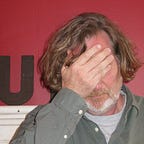RFBC #8: When We Cease to Understand the World (and a link to the show)
Wow. Where to even begin with this one?
How about here: Benjamin Labatut’s 2021 work of fiction, When We Cease to Understand the World, translated from the Spanish by Adrian Nathan West, was shortlisted for the International Booker Prize and the National Book Award for Translated Literature. It was one of The New York Times’s 10 Best Books of 2021.
Or how about here: It’s a mind-blowing mixture of fact and fiction about mathematics, astronomy, particle physics, genius, madness, and the surprising—no, shocking—moral consequences of some of the most important scientific discoveries in the history of humankind.
And none of that begins to do justice to the crazy, brilliant, unputdownable book we discussed at our most recent meeting of Radio Free Book Club—a discussion you can hear on Mixcloud, or anywhere you stream podcasts. Our usual warning about spoilers applies, but we can’t really see how this book is even spoilable. So maybe just go ahead and listen to the show.
Show notes:
The RFBC crew for our February 2023 show was Indianapolis writer Ken Honeywell; writer/baker/hiker Traci Cumbay; former Butler University professor and award-winning author of The Town of Whispering Dolls, Susan Neville; and Dan Barden, novelist and director of Butler University’s MFA in Writing program. Our show was recorded at Listen Hear in Indianapolis and produced by the exceptional Oreo Jones for 99.1 WQRT-LP.
Mysterious forces were at work. We recorded a discussion early in February to make our second-Saturday-of-the-month airdate. But some ghost in the machine had other plans and glitched up the recording, rendering it unlistenable, and not in a Nickelback way. We decided the perhaps The Universe was trying to prevent us from spilling its secrets. The joke was on It: We re-recorded the show, and it was just as interesting a discussion the second time around.
When, actually, do we cease to understand the world? The answer is, continually, at least since the discoveries of astronomers and physicists and mathematicians in the twentieth century. The book’s first chapter, “Prussian Blue,” opens with a string of developments that defy belief only in wild swing, from angelic to horrific, of the consequences of their discovery. Crazy to realize, but not intellectually unintelligible. But the stories get weirder and weirder as what we think of as reality begins to disintegrate. There are surely things about the world we’ve yet to discover. But there are also things that are by their very nature unknowable.
The role of madness in discovery. One of the most interesting parts of our discussion was the question of whether the discoveries featured in the book drove the scientists and mathematicians mad (Dan’s position), or their own peculiar madness was what led them to their discoveries (Susan’s position). Clearly, one could go either way. Let us know what you think.
The most disturbing image in the book? Was it the Hitler Youth passing out cyanide capsules from baskets at the end of a concert? The discovery that at certain places in the universe, time and space have no meaning? The twentieth century’s most brilliant mathematician renouncing and literally setting fire to all his work? Was it the ghosts of Goethe and Hafiz engaging in oral sex in a way that somehow led one of the most brilliant theoretical physicists in history to a discovery that destroyed the idea of a deterministic universe? A cat that’s both alive and dead? We could go on. What may be even more disturbing is that most of these images are historically verifiable.
The original title of the book as published in Spanish was Un Verdor Terrible, or A Terrible Greenness. The phrase appears in a letter from guy to his wife in “Prussian Blue” and the concept is revisited in the final story/chapter, “The Night Gardener.” What did that mean in context? Was it a better title? We had ideas.
Would we recommend it? Four resounding yeses. It was certainly one of the most memorable reading experiences any of the four of us has had in recent memory. Traci pledged to read it again every year. Even as you read this, she might be reading it again.
Bonus recommendations: Traci recommended James Baldwin’s short story “Sonny’s Blues,” in the collection Going to Meet the Man. Susan recommended Trust by Hernan Diaz (the subject of an upcoming episode of Radio Free Book Club). Dan recommended Orwell’s Roses by Rebecca Solnit. Ken’s recommendation was W.G. Sebald’s Austerlitz.
Next month: We’ll be taking a wild ride through a haunted, zombified alternate New Orleans with Alex Jennings’s The Ballad of Perry Graves. Hope to have you onboard.
